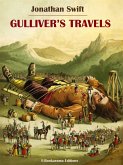Gulliver's Travels by Jonathan Swift Gulliver's Travels, or Travels into Several Remote Nations of the World. In Four Parts. By Lemuel Gulliver, First a Surgeon, and then a Captain of Several Ships is a 1726 prose satire by the Anglo-Irish writer and clergyman Jonathan Swift, satirising both human nature and the "travellers' tales" literary subgenre.
It is Swift's best known full-length work, and a classic of English literature. Swift claimed that he wrote Gulliver's Travels "to vex the world rather than divert it".
The book was an immediate success. The English dramatist John Gay remarked "It is universally read, from the cabinet council to the nursery." In 2015, Robert McCrum released his selection list of 100 best novels of all time in which Gulliver's Travels is listed as "a satirical masterpiece".
It is uncertain exactly when Swift started writing Gulliver's Travels. (Much of the writing was done at Loughry Manor in Cookstown, County Tyrone, whilst Swift stayed there.) Some sources[ which?] suggest as early as 1713 when Swift, Gay, Pope, Arbuthnot and others formed the Scriblerus Club with the aim of satirising popular literary genres.
It is Swift's best known full-length work, and a classic of English literature. Swift claimed that he wrote Gulliver's Travels "to vex the world rather than divert it".
The book was an immediate success. The English dramatist John Gay remarked "It is universally read, from the cabinet council to the nursery." In 2015, Robert McCrum released his selection list of 100 best novels of all time in which Gulliver's Travels is listed as "a satirical masterpiece".
It is uncertain exactly when Swift started writing Gulliver's Travels. (Much of the writing was done at Loughry Manor in Cookstown, County Tyrone, whilst Swift stayed there.) Some sources[ which?] suggest as early as 1713 when Swift, Gay, Pope, Arbuthnot and others formed the Scriblerus Club with the aim of satirising popular literary genres.








